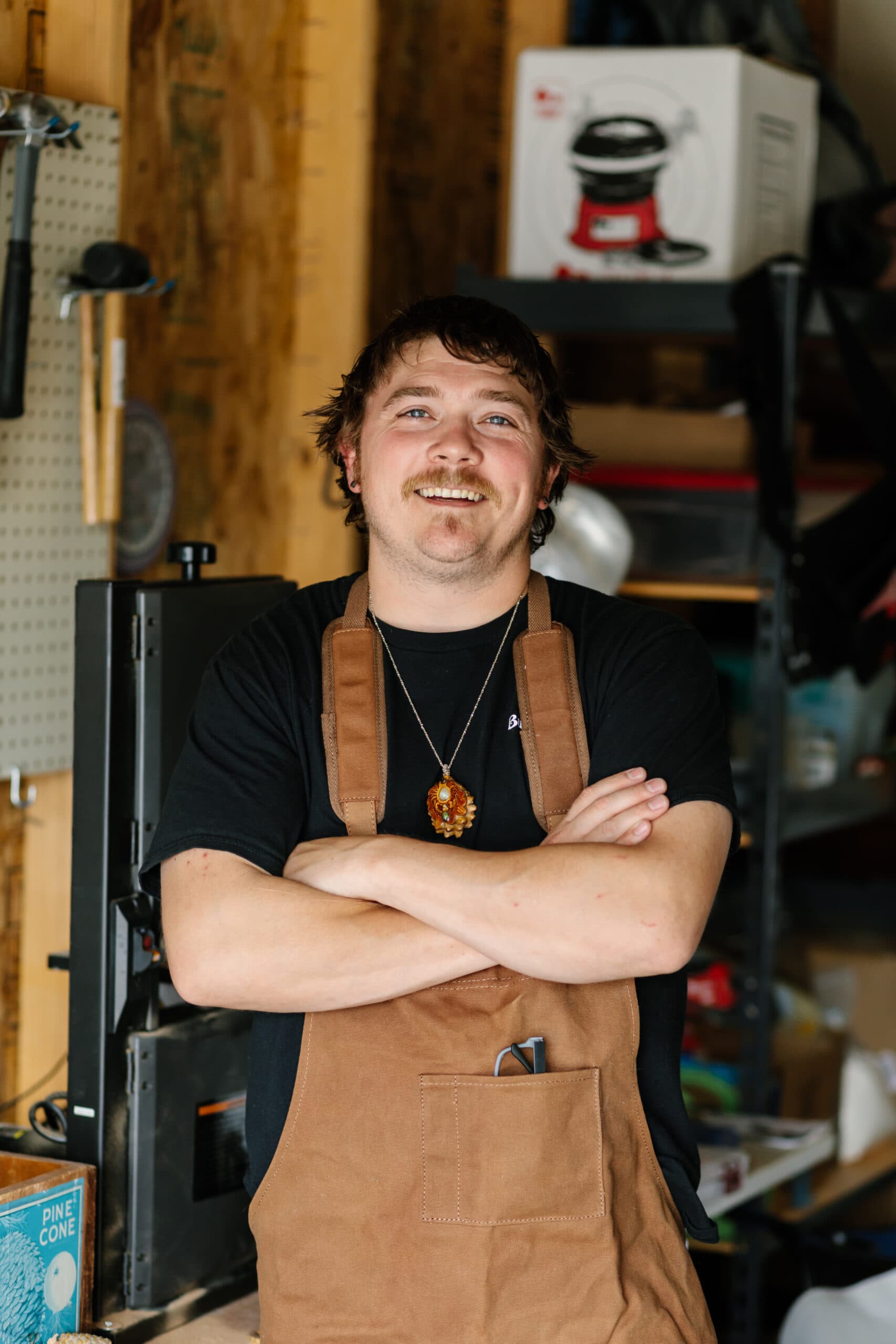Blazing a Trail

Corey Rafeld didn’t grow up dreaming to be a firefighter. In fact, she stumbled into the occupation by chance. She was working as a ski patroller at Grand Targhee Resort, and wanted to upgrade her first-aid training.
Teton County Fire and Rescue was offering a free Emergency Medical Technician course to people who were also willing to take—while getting paid—a fire-training course. Corey chose the economic option. She had time, but little money.
“I was just trying to figure out how to live here,” she says.
Corey grew up in Maryland. After graduating from Wesleyan University in 2005, she came to Teton Valley to work in the equipment room at the National Outdoor Leadership School (NOLS) Driggs base for the summer. Her plan was to head back in the fall to an investment banking job in Washington, D.C. But like so many people who land in the valley—thinking it’s only for a season—she fell in love with the mountains.
“People seemed so happy here,” Corey says. “I wanted that kind of life.”
She began working a series of seasonal jobs to support herself. Those jobs included managing that same equipment room for NOLS, working at Pendl’s Bakery in Driggs, and landscaping. It was while she was landscaping that her boss, Joe Calder, who is also the head of Grand Targhee’s ski patrol, suggested she consider ski patrolling.
“At the time, I didn’t think my skiing was up to ski patrol standards,” Corey says. “But I took the first-aid course, and after I finished, I thought to myself, ‘I’m good at this. I’m good at staying calm in stressful situations.’ Plus, I found the work interesting. So, I started ski patrolling, which eventually led to my EMT course and the fire-training course, and on to becoming a reserve for the fire department.”
In 2012, Corey went from being a reserve, or volunteer, to a full-time employee. She was Teton County Fire and Rescue’s first woman firefighter to join the ranks in that capacity. And as of last April, she and fellow firefighter Becca Parkinson became the department’s first women captains.
The nation’s fire teams remain predominantly male. The first credited female firefighter in the United States was also its first known black woman to take up the mantle. At age 71, the formerly enslaved Molly Williams volunteered with the Manhattan brigade in 1818. It wasn’t until much later, however, that women became official members of the nation’s fire teams. In 1974, there was only one woman firefighter in the country. By 1980, there were two hundred. Today, there are roughly 15,000 women career firefighters and 78,000 volunteers. Still, that represents less than 5 percent of all career firefighters and 11 percent of volunteer firefighters in the country.
Teton County Fire and Rescue has three women working as part of the official firefighter/EMT crew and, on the administrative side, a female chief financial officer.
“Those numbers are too small and obviously are far behind where they need to be,” says Mike Maltaverne, Teton County Fire Chief. “I believe the low numbers are related to the challenges that women face in a male-dominated workplace. It is a very physically demanding job; women may not be widely accepted by their male counterparts; and some organizations may not provide the benefits and leave that allow a woman to have children. I don’t believe we have those issues in Teton County. Women are accepted and embraced in our organization and, quite honestly, they are bad-ass firefighters.”
“For the most part, everyone was welcoming when I came on board,” Corey says. “Some people were a little less friendly at first, and I heard things through the grapevine that a couple of folks thought women should not be working here, but that was it. Now it has come full circle. I think time, and proving my strength and worth, smoothed things over, and it definitely helped having Becca start working, so there were two strong women… I’m treated as an equal now.”




Becca Parkinson joined the fire department about a year after Corey. A third woman, Charis Schreiber, has been on the team for the last six years. The rest of the roughly twenty-five-member crew is male, but both Corey and Becca say any differences they feel at work come from themselves rather than their male counterparts.
“The three of us are more concerned than some of our colleagues about being fit enough, strong enough, but that pressure is totally self-induced,” says Becca. “We want to know we will be able to drag a two-hundred-pound person out of a building.
Now, as captains, each supervises the crew of the shift and station they are assigned to. “I’m flattered by the recognition and hope it inspires girls to check out Fire & Rescue,” Becca says. “But at the end of the day, I’m just here doing my job. Being promoted to captain from a skilled and capable pool of coworkers validates the work and commitment Corey and I put into developing our skills and our experience to be good at our job, and capable of leading a crew.”
Corey likes not knowing what a shift will bring. One day, she’ll spend hours transporting patients to the hospital in Idaho Falls. On another, she’ll be called out on an automobile accident, a house fire, or a medical emergency. The variety keeps her sharp and engaged, but it can be stressful.
“We show up on the worst day of someone’s life,” Corey says. “I like helping people in those stressful times. It’s rewarding. And, for me, the variety means you never know what you are going to get. I’d get bored if I had to do the same thing over and over again. But I have to deal with stress. Your adrenaline starts flowing whenever a call for something big comes in.”
In 2024, Teton County Fire and Rescue received the largest recorded number of calls for the department, at just over one thousand, or an average of three per day. Of those calls, 68 percent were medical in nature and 32 percent were fire, rescue, or service-related. Some days are more intense emotionally and physically than others. One of Corey’s first calls as a reserve involved a house fire with a fatality. She says training, practice, and exercise help her deal with such difficult situations.
“For me, the best way to deal with stress is to move,” Corey says. “I don’t work out to look good. I want to be strong, but it’s 80 percent mental. Moving is what clears my mind. Getting outside doing something, breathing fresh air; it’s the only time I feel I can forget about stuff. When I’m biking hard uphill, I can’t think of anything else.”
Corey has two daughters, a 10-year-old and a 2-year-old. Surprisingly, she says, the fire department’s shift scheduling—48 hours on, 96 hours off, on a rotating six-day week—works well for her as a mother. Her husband works from home, so he covers childcare while she is at the station. When she is off, she is completely available for her kids.
“With two days a week on, I get four days off with the girls,” she says. “It’s not just getting them ready for school and then putting them to bed at night. I have all day.”
“Corey’s attitude is a standout blend of discipline, passion, and humility,” says Dayne Toney. Dayne and her husband run Targhee Athletics, where Corey has trained since the facility opened eleven years ago. “Despite her many strong roles as a firefighter, an athlete, and a mother, Corey remains remarkably humble, serving as a powerful example of how women can excel in multiple demanding roles with grace and resilience.”
Combine grace and resilience with physical and mental strength, and you have the ingredients for an effective, successful firefighter … regardless of gender.






